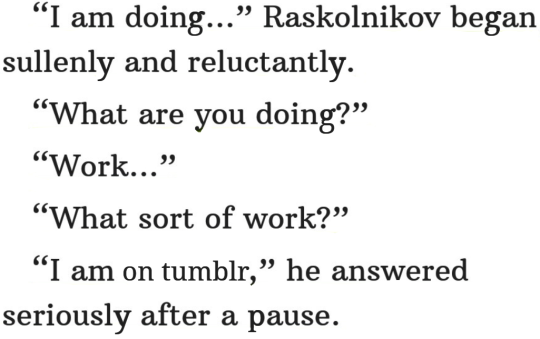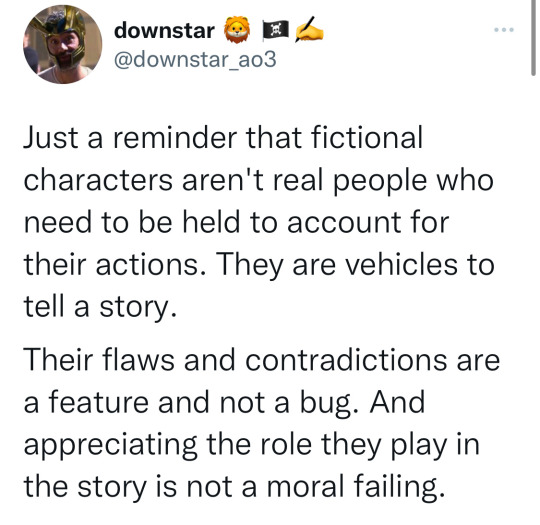Hi, I'm Lexi, please enjoy my writing and posts. My Tumblr experience has moved me from writing fanfiction to writing my own stories and making an attempt at writing my thoughts on what I'm reading and what reflections I have on it. I really appreciate constructive feedback on my stories.
Don't wanna be here? Send us removal request.
Photo
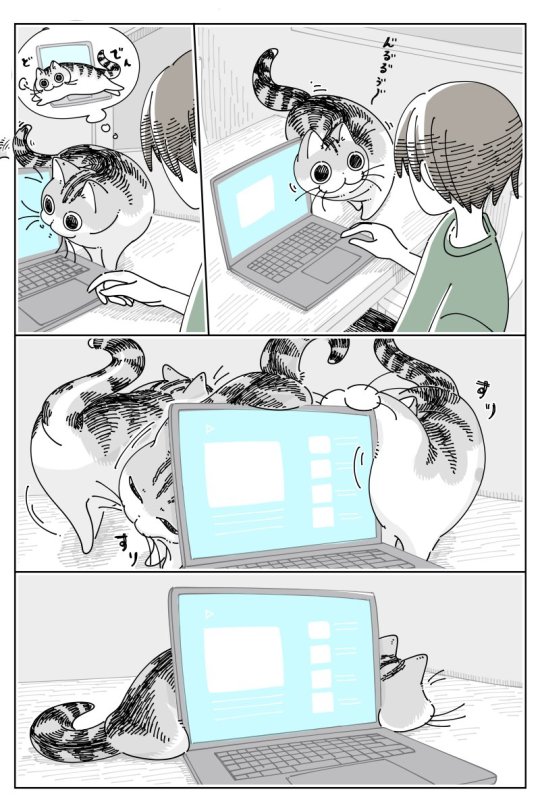
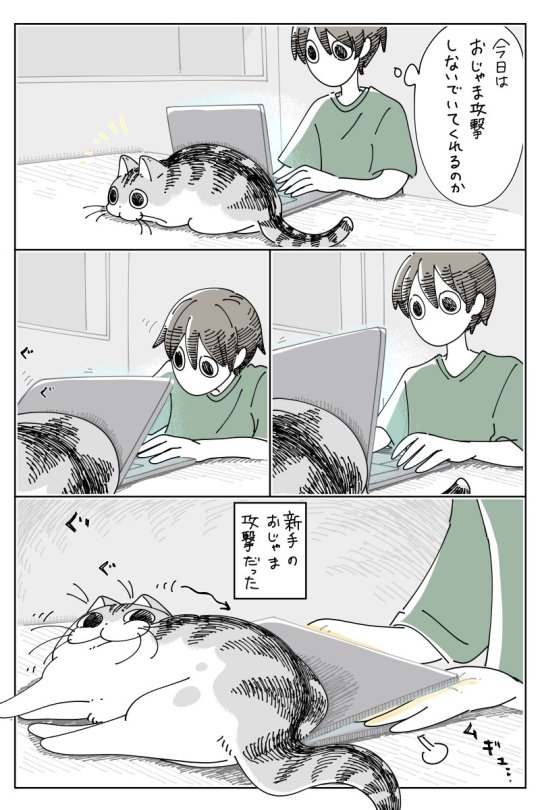
(おじゃま攻撃かと思いきや | キュルZ@5巻7/27 さんのマンガ | ツイコミ(仮)から)
71K notes
·
View notes
Text
https://vm.tiktok.com/ZTdQuxw52/
I think I found my new favorite rabbit hole. This voice actor does Shakespeare scenes in a southern accent and I need to see the whole damn play. Absolutely beautiful
129K notes
·
View notes
Text
Odysseus's story, particularly how it's shown in Epic, just shows how horrible a world is without a loving God and a saviour. Odysseus would have wept at Christ's feet.
101 notes
·
View notes
Text
The word you are looking for is “selfish.” Not narcissist, not sociopath, selfish.
81K notes
·
View notes
Text
I think the Hunger Games series sits in a similar literary position to The Lord of the Rings, as a piece of literature (by a Catholic author) that sparked a whole new subgenre and then gets blamed for flaws that exist in the copycat books and aren’t actually part of the original.
Like, despite what parodies might say, Katniss is nowhere near the stereotypical “unqualified teenager chosen to lead a rebellion for no good reason”. The entire point is that she’s not leading the rebellion. She’s a traumatized teenager who has emotional reactions to the horrors in her society, and is constantly being reined in by more experienced adults who have to tell her, “No, this is not how you fight the government, you are going to get people killed.” She’s not the upstart teenager showing the brainless adults what to do–she’s a teenager being manipulated by smarter and more experienced adults. She has no power in the rebellion except as a useful piece of propaganda, and the entire trilogy is her straining against that role. It’s much more realistic and far more nuanced than anyone who dismisses it as “stereotypical YA dystopian” gives it credit for.
And the misconceptions don’t end there. The Hunger Games has no “stereotypical YA love triangle”–yes, there are two potential love interests, but the romance is so not the point. There’s a war going on! Katniss has more important things to worry about than boys! The romance was never about her choosing between two hot boys–it’s about choosing between two diametrically opposed worldviews. Will she choose anger and war, or compassion and peace? Of course a trilogy filled with the horrors of war ends with her marriage to the peace-loving Peeta. Unlike some of the YA dystopian copycats, the romance here is part of the message, not just something to pacify readers who expect “hot love triangles” in their YA.
The worldbuilding in the Hunger Games trilogy is simplistic and not realistic, but unlike some of her imitators, Collins does this because she has something to say, not because she’s cobbling together a grim and gritty dystopia that’s “similar to the Hunger Games”. The worldbuilding has an allegorical function, kept simple so we can see beyond it to what Collins is really saying–and it’s nothing so comforting as “we need to fight the evil people who are ruining society”. The Capitol’s not just the powerful, greedy bad guys–the Capitol is us, First World America, living in luxury while we ignore the problems of the rest of the world, and thinking of other nations largely in terms of what resources we can get from them. This simplistic world is a sparsely set stage that lets us explore the larger themes about exploitation and war and the horrors people will commit for the sake of their bread and circuses, meant to make us think deeper about what separates a hero from a villain.
There’s a reason these books became a literary phenomenon. There’s a reason that dozens upon dozens of authors attempted to imitate them. But these imitators can’t capture that same genius, largely because they’re trying to imitate the trappings of another book, and failing to capture the larger and more meaningful message underneath. Make a copy of a copy of a copy, and you’ll wind up with something far removed from the original masterpiece. But we shouldn’t make the mistake of blaming those flaws on the original work.
159K notes
·
View notes
Text
Thinking about how CS Lewis officially lost his faith, squelched in the mud and despair of the trenches in World War I, and wrote poetry railing against God—then made friends with Tolkien, who had lost quite literally all but one of his original friends just a hundred or so miles away in the same trenches. And how Lewis became The friend for Tolkien, which brought together a whole group of them. And how Tolkien brought his faith back to Lewis. And when the next dark night came, when the Germans were bombing them in their own homes this time, the BBC cast about for a voice to provide faith and hope to the nation, and found Lewis to do it. The man who’d been crushed by the last trenches and brought out of it by faith. And meanwhile Tolkien with the encouragement of his friend Lewis would be creating eucatastrophe in his epic that would settle for Tolkien and many others the gloom of despair into unlooked for hope.
2K notes
·
View notes
Text




The Joan of Arc sweater is complete! Made entirely out of secondhand acrylic yarn. Started April 22nd, finished July 11th.
10K notes
·
View notes
Photo
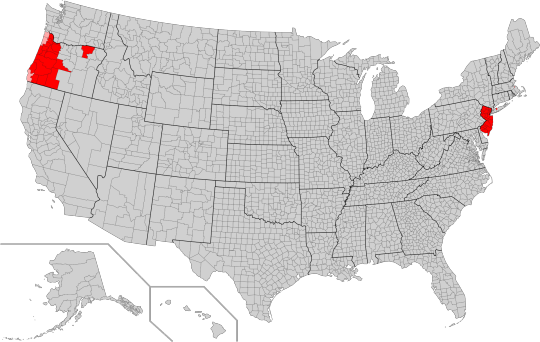
Parts of the country where self-service gas pumping is illegal.
85K notes
·
View notes
Text

Remember calming cat? Remember when tumblr was this color? If you don’t that’s fine. I just feel old and alone.
100K notes
·
View notes
Text
the older I get the more I'm like wow Anne Shirley was right. I am so glad to live in a world with Octobers. Kindred spirits are not so scarce as I used to think. Dear old world you are very lovely and I am glad to be alive in you.
2K notes
·
View notes




